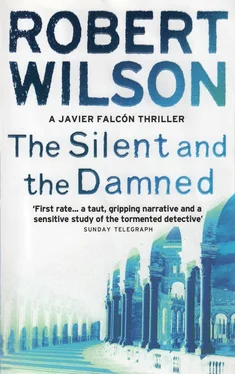'When the news came through about Montes I could have sent anybody down here,' said Guzmán, 'but then
I heard that you were going to run the inquiry and for no good reason I decided it was time to meet Javier Falcón.'
'Well, you've given me a break, so I'm glad.'
'It's a strange line that – in Vega's note. It seems almost poetic. There's emotion in there. It's like a spirit threatening,' said Guzmán. 'Why do you think I'm so right about it?'
'Apart from the South American connection,' said Falcón, 'we've also heard about discussions Vega had with his American neighbour, Marty Krugman, and a few things he'd mentioned to Pablo Ortega. Between them they built a picture of a man with very right-wing views, anti-communist, pro-capitalism and largely pro- American in terms of the spirit of enterprise. But he also held some negative views about the way in which US governments interfered with other countries, how they were your friends until you were no longer useful to them… that kind of thing. I also found files in his study on international courts of justice and the work of Baltasar Garzón. Look at all that in the context of his secretive nature, the fact that he seems to have been a trained, connected Hispanic with a knowledge of American society, and this guy begins to look like a politically motivated, disappointed man who died with what he considered to be an important date in his hand.'
'And why do you think he did that?'
'Personally, I think it was because he was being murdered, that he wanted to make sure that his death was investigated as murder and that whatever secrets he held would be discovered and told to the world.'
'So now where is your theory about Carvajal, the Russians and Montes?'
'What do you mean?'
'You seem to think that Montes was responding to pressure that you were unconsciously applying. The mention of Carvajal and the Russians – Ivanov and Zelenov. Would that have been enough to push him over the edge? Or was he looking at those names in the context of the Vega investigation, and it was that which made him certain that you were on to something?'
'Let's wait until we get a response from the FBI. If he did have a criminal record, that might be indicative of something that's relevant here.'
'If he's Chilean he sounds like a disaffected pro- Pinochet man to me,' said Guzmán. 'And there were plenty of them about in the ranks of Patria y Libertad – the extreme right-wing organization who were bent on destabilizing Allende from the moment he won the election. A lot of their members did some very nasty things before, during and after the coup – the kidnappings and assassinations abroad within Operation Condor, the killings and torture at home, the Washington car bomb – and they thought they deserved better. They'd stopped the rampage of communism up to America's back door and they felt they should be properly rewarded for it. But you said he was keeping these files on the justice systems and Garzón. That sounds as if he was heading for the confessional.'
'I think he was looking for something a bit bigger than the confessional,' said Falcón. 'More like the witness stand in a major court. Something seems to have happened to him at the end of last year. Something personal, which might have changed him. He was suffering from anxiety attacks…'
'Well, maybe that clouded his judgement. People who were involved always think they're more important than they actually were,' said Guzmán. 'Colonel Manuel Contreras, the ex-chief of DINA – the secret police – is now in jail, beautifully betrayed by Pinochet, and what's happened? Documents were released by the Clinton administration in 1999, and what's happened? More material was released by the CIA themselves in 2000, and what's happened? Have we had any justice? Have the perpetrators been punished? No. Nothing has happened. It's the way of the world.'
'But what could have happened? Who's left? Who's accountable?'
'There are some CIA men who should still be sweating in the dark and there's my old friend, the Prince of Darkness – Dr K himself. He was Nixon's National Security Adviser and Secretary of State over that whole period. Nothing happened in Chile without him knowing about it. If anybody should be held to account, he should.'
'Well, if you could finger him, you'd go down in history,' said Falcón. 'And if Vega was about to do that there must be plenty of people who'd want to kill him?'
'In my experience, if the CIA had decided he was dangerous for their public relations profile, they'd want to make it look like suicide – and then make a complete mess of it,' said Guzmán. 'These American neighbours of his, what's their background?'
'He's an architect working for Vega, she's a photographer. It was her photographs of him that gave us an insight into his personal crisis. That's her speciality.'
'Well, that's pretty good cover if you wanted information on somebody,' said Guzmán.
They've both got totally genuine backgrounds,' said Falcón. They were even suspects in a murder inquiry into the death of the woman's lover back in the USA. No charges were brought.'
They don't smell so sweet, even if they are real enough,' said Guzmán. 'But then that's the nature of perfect cover, I suppose. We all have something ugly hidden away.'
Falcón got to his feet and started pacing the room. The complications were building by the hour and he had no time, never any time.
'If this is some sort of intelligence operation,' he said, 'and the Krugmans have been pressurized into service, then there must be collusion between the CIA and the FBI. And we're now asking the FBI for information on Rafael Vega.'
'For a start, you can't do anything else,' said Guzmán. 'And anyway, these are not perfect organizations. I imagine very few people will know about this. They've got their hands full with the War on Terror. This is a side game, a small issue. Possibly private.'
Falcón went to the phone and started dialling.
'I'm going to talk to Marty Krugman again,' he said. 'I'll come at him from a different angle.'
'But you don't know anything yet.'
'I realize that, but I have no time. I have to start now.'
Falcón was saved by the fact that Krugman was not in his office or at home and his mobile was turned off. He slammed the phone down.
'Krugman has a weakness,' said Falcón. 'His wife is a beautiful woman who is much younger than him.'
'And he's a jealous man?'
'It's his weak point,' said Falcón, 'a way to lever him open.'
'All this will go up in smoke if you don't get a positive ID from the FBI,' said Guzmán. 'So don't do anything until then. In the meantime, if you think it will help, I'll put that line he was holding in his hand out into the Chilean expatriate communities here and in England, see what they make of it. And if you do get a positive ID and he was Chilean and military, or DINA, I am in contact with people who could help build a profile.
'I'll also write an article about Montes and the first suicide of a senior officer at the Jefatura. It will be a kind of obituary with the big moments of his career, including the Carvajal scandal, pointed up. I'll emphasize your in-depth investigation into Montes's career.'
'And what will we get out of that?'
'You'll see. It'll smoke people out. There'll be plenty of anxiety around, especially from the ones who turned a blind eye to Carvajal's "accident",' said Guzmán. 'It'll be interesting to see the pressure that comes down on you from upstairs. If Comisario Lobo doesn't call you into his office first thing in the morning after the Diario de Sevilla has hit the streets, I'll buy you lunch.'
'Only the facts,' said Falcón, a wave of anxiety ripping through him.
'That's the beauty of it. Everything I'll write about Montes will already be in the public domain. There won't be any need for conjecture. It's just the way in which I put it all together that will frighten people to death.'
Читать дальше
Конец ознакомительного отрывка
Купить книгу












